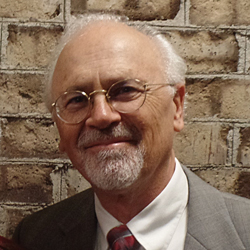God’s Mission Has a Church
The current culture shift is an opportunity to allow God to reshape and re-form us to become the missionary church that God intends.
By Howard Miller
 As our world is racked by an extraordinary cultural shift, the church finds itself in a state of deep disorientation. Unfortunately, the church’s response has often been fight or flight. This is not the narrow road to which we are called. Our disorientation, as well as the rapid culture shift itself, demand that the church find a faithful way forward.
As our world is racked by an extraordinary cultural shift, the church finds itself in a state of deep disorientation. Unfortunately, the church’s response has often been fight or flight. This is not the narrow road to which we are called. Our disorientation, as well as the rapid culture shift itself, demand that the church find a faithful way forward.
What is that way? I believe we will find it by firmly embracing God’s kingdom reign and pairing it with a robust understanding of God’s missionary character.
We must begin, in fact, by embracing that God is, by his very nature, a missionary God. This means that mission is an essential attribute of God: our Father pursues us, offering restored relationship and reconciliation with his creation, across all barriers and brokenness. Most of us never consider the truth of this! The biblical record points us toward this picture of God’s nature. In Genesis, the Lord made the world because he is a missionary God! Although he is sufficient in himself, God chose to create a world inhabited by people so that he might relate to beings outside of himself. When sin entered the world, God promised to redeem and renew all of creation.
This missionary God called Abraham and promised that his heirs would be a blessing to the world, and then sent Abraham to a promised land. In Exodus God brought deliverance to Israel, commissioning them to live as God’s culturally-contrasting people. Through the prophets God continually gave witness to the coming light which would be for all people.
In the New Testament, Matthew announced a Savior who had Gentile women in his family tree, was worshiped by foreign scholars, declared that this “gospel of the kingdom will be preached in the whole world as a testimony to all nations” (Matthew 24:14), and concluded by giving a worldwide commission to go into all the world.

The purpose for the church radically changes when we begin naming that God is a missionary God. Jesus is the embodiment of God’s mission, and in John’s Gospel Jesus identifies himself as being “sent” forty-nine separate times. Then, near the end of the Gospel of John, He says, “As the Father has sent me, I am sending you” (John 20:21). With this view we come to understand that it’s not that the church has a mission, but rather that God’s mission has a church.
The impact of this truth is profound for the identity and nature of the church. The church of this missionary God must therefore be a missionary church. This church gathers for worship and then is sent into the world to live as Christ lived. It is Jesus’ incarnation that models the way of God’s kingdom, which is to be emulated by the church.
The purpose for the church radically changes when we begin naming that God is a missionary God.
Jesus began his earthly ministry by proclaiming “the kingdom is at hand, repent and believe…” (Mark 1:15). Jesus then went out and began to teach, heal, and deliver from demonic oppression, demonstrating the way of the kingdom.
Jesus demonstrated the will of the Father by renouncing worldly power, replacing it with presence and servanthood. In the incarnation of Jesus Christ, God revealed himself as the one who is with and for his creation. Now, as the risen Lord sends his Spirit to empower the church, we are called to become God’s people present in the world, with and for the world.
Our church history is shaped by the legacy of Christendom: the church aligning with political power to protect and maintain our position in society. This is vastly different from understanding the church being shaped as a missionary church whose calling is to be embedded as “sent ones” in our own societies. The current crisis presented by culture shift is an opportunity to allow God to reshape and re-form us to become the missionary church that God intends.
As a pastor, I seek to model this way of discipleship for God’s people. First, I pray for my own identity shift, that I would be formed as a missionary right where I am. Included in this prayer is that I be sent to those who are spiritually hungry. God has answered this prayer by sending first one and then many persons with addictions, hurts, habits, and hang-ups.
Second, I have crafted a purpose statement for my life: “I am a living commitment to engage a deeply divided world through spiritual friendship.” To be a spiritual friend leads me to be present, to listen, and to believe that God’s Spirit is speaking and drawing persons in ways that I am unable to see. In faith I ask God to show me how the Spirit is at work in a person’s life.
Third, I live daily with a profound sense that I represent God’s people who are called to be a sign (God is at work, redeeming the world), a foretaste (the kingdom reign has begun), and an instrument (living the way of redemption), of the reign of God.
We follow Christ, the sent one, into God’s own vocation. May we, as the church of our missionary God, learn to follow his invitation of “sent-ness” so that we can sincerely proclaim as Christ proclaimed, “the kingdom is at hand, repent and believe the good news.”
Howard Miller is Pastor of Huntington Mennonite Church in Newport News, Va.
